- Clone
- W16012A (See other available formats)
- Regulatory Status
- RUO
- Other Names
- Aryl hydrocarbon receptor, Ah receptor, AHR, Ah, Ahh, Ahre, bHLHe76
- Isotype
- Rat IgG2b, κ
- Ave. Rating
- Submit a Review
- Product Citations
- publications
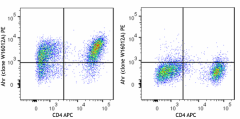
-

C57BL/6 mouse splenocytes were stimulated with (left) or without (right) recombinant human TGF-β1 and recombinant mouse IL-6 for 3 days. Cells were surface stained with anti-mouse CD4 APC, fixed and permeabilized, then intracellularly stained with anti-mouse AhR (clone W16012A) PE.
| Cat # | Size | Price | Quantity Check Availability | Save | ||
|---|---|---|---|---|---|---|
| 694503 | 25 µg | 193 CHF | ||||
| 694504 | 100 µg | 547 CHF | ||||
The Aryl hydrocarbon receptor (AHR) is a member of the basic helix–loop–helix–PER– ARNT–SIM (bHLH–PAS) subgroup of the bHLH superfamily of transcription factors and is the only member of this family known to be activated by ligands. Those ligands can be endogenous, naturally occurring, and/or anthropogenic. In vitro studies and gene expression profiles showed that the transcriptional changes by the activated Ahr are ligand specific and are highly cell specific. There is only one ligand binding pocket in the AHR (in the Per-ARNT-Sim-B domain), and the affinity of the best characterized high affinity ligand, TCDD (2,3,7,8-tetrachlorodibenzo-pdioxin), depends on only a few amino acids in that pocket. The Ahr can also be activated by numerous stress factors and substances that may not fit into the binding pocket, such as hyperoxia, oxidized low-density lipoproteins, hydrogen peroxide, ozone, and metals. Ahr regulates genes involved in a wide variety of biochemical pathways, including energy metabolism, lipid and cholesterol synthesis, xenobiotic metabolism and various transporters. The Ahr is well known to be involved in a variety of cellular processes, such as the cell cycle, epithelial barrier function, cell migration, and immune function.
Product DetailsProduct Details
- Verified Reactivity
- Mouse
- Antibody Type
- Monoclonal
- Host Species
- Rat
- Immunogen
- Partial mouse Ahr (635-848 a.a.) expressed in E. coli.
- Formulation
- Phosphate-buffered solution, pH 7.2, containing 0.09% sodium azide
- Preparation
- The antibody was purified by affinity chromatography and conjugated with PE under optimal conditions.
- Concentration
- 0.2 mg/mL
- Storage & Handling
- The antibody solution should be stored undiluted between 2°C and 8°C, and protected from prolonged exposure to light. Do not freeze.
- Application
-
ICFC - Quality tested
- Recommended Usage
-
Each lot of this antibody is quality control tested by intracellular immunofluorescent staining with flow cytometric analysis. For flow cytometric staining, the suggested use of this reagent is ≤ 1.0 µg per million cells in 100 µL volume. It is recommended that the reagent be titrated for optimal performance for each application.
- Excitation Laser
-
Blue Laser (488 nm)
Green Laser (532 nm)/Yellow-Green Laser (561 nm)
- Application Notes
-
Clone W16012A does not cross-react with human (in-house tested).
- RRID
-
AB_2910499 (BioLegend Cat. No. 694503)
AB_2910499 (BioLegend Cat. No. 694504)
Antigen Details
- Structure
- 848 amino acids with a predicted molecular weight of 95 kD.
- Distribution
-
Cytoplasm and nucleus
- Function
- Ligand-activated transcriptional activator. Binds to the XRE promoter region of genes it activates. Activates the expression of multiple phase I and II xenobiotic chemical metabolizing enzyme genes (such as the CYP1A1 gene). Mediates biochemical and toxic effects of halogenated aromatic hydrocarbons. Involved in cell-cycle regulation. Regulates the circadian clock by inhibiting the basal and circadian expression of the core circadian component PER1. Inhibits PER1 by repressing the CLOCK-ARNTL/BMAL1 heterodimer mediated transcriptional activation of PER1.
- Interaction
- In the nucleus, heterodimer of AHR and ARNT. Interacts with coactivators including SRC-1, RIP140 and NOCA7, and with the corepressor SMRT. Interacts with MYBBP1A, NEDD8, ARNTL/BMAL1.
- Ligand/Receptor
- Hydrophobic aromatic compound
- Biology Area
- Cell Biology, Transcription Factors
- Antigen References
-
- Bersten DC, et al. 2013. Nat Rev Cancer. 13:827-41.
- Murray IA, et al. 2014. Nat Rev Cancer. 14:801-14.
- Reisz-Porszasz S, et al. 1994. Mol Cell Biol. 14:6075-86.
- Esser C and Rannug A. 2015. Pharmacol Rev. 67:259-79.
- Sun YV, et al. 2004. Nucleic Acids Res. 32:4512-23.
- Whelan F, et al. 2010. Mol Pharmacol. 77:1037-46.
- Gene ID
- 11622 View all products for this Gene ID
- UniProt
- View information about Ahr on UniProt.org
Related Pages & Pathways
Pages
Related FAQs
- What type of PE do you use in your conjugates?
- We use R-PE in our conjugates.
Other Formats
View All Ahr Reagents Request Custom Conjugation| Description | Clone | Applications |
|---|---|---|
| Purified anti-Ahr | W16012A | WB,KO/KD-WB |
| PE anti-Ahr | W16012A | ICFC |
Customers Also Purchased
Compare Data Across All Formats
This data display is provided for general comparisons between formats.
Your actual data may vary due to variations in samples, target cells, instruments and their settings, staining conditions, and other factors.
If you need assistance with selecting the best format contact our expert technical support team.
 Login / Register
Login / Register 









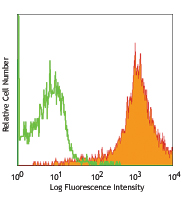
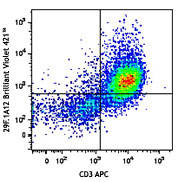
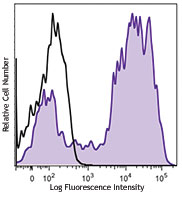
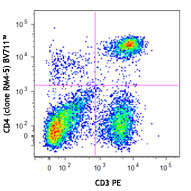
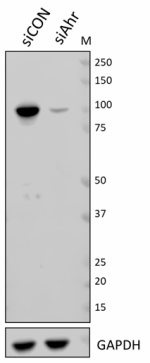




Follow Us